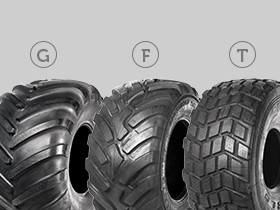Choose the best tyre for every job
The theory
A bit of theory. There is ultimately only one thing that carries the weight: not the tyre, but the air ín the tyre. The more volume the tyre has, the more air it can hold. And the more the pressure per cm2 decreases, the wider the track. And the more the tyre can carry when the inflation pressure does reach 100%. To get that wider track, you can also choose a wider tyre. In all cases, a strong radial carcass is essential for a strong, durable tyre. That, together with the substantial ('physical') increase in tractors and machinery, is the basis towards the development of high-volume tyres.
Large-volume
Because of the higher carrying capacity, the large-volume tyre - such as for (self-propelled) slurry tanks and harvesters - once arrived. Compared to standard tyres, they can hold more air and handle more mass. They are larger and wider and therefore track less. They offer a lot of grip with the same outer diameter and rolling circumference as a standard tyre.
Note that increasing the diameter is not a problem for legislation. But in terms of width, there are restrictions. Tractors cannot be wider than 3 metres. If that size is increased by wider tyres, you will need to apply for an exemption.
Conveyor belt
If most or all of the work is done on paved surfaces, we recommend conveyor belts. These are unique in that they can cope excellently with high loads at higher speeds. In other words, they have a very high load-bearing capacity. In terms of carcass, these tyres are quite stiff and are usually not suitable for working with varying tyre pressures. They often have an all-steel carcass. this type of carcass is made entirely of steel, as with the Aeolus AE74.
Flotation tyre
Flotation or IF tyres have greater sidewall flexibility than conveyor belts at the same circumference. With IF tyres, up to 20% more load is possible without having to increase tyre pressure. This improves efficiency.
But we can go one step further. These are tyres with VF technology, such as the latest Alliance Agriflex+ tyres. With these tyres, you can even load up to 40% more at the same inflation pressure. The main advantage of Very High Flexion (VF) tyres is that they prevent soil compaction as much as possible. While maintaining optimum mobility in the field in wet soil conditions. In addition, with this type of tyres you have the option of maintaining a constant (low) tyre pressure at any speed. This saves extra time and therefore a lot of efficiency.
Like to know more?
Do you need advice? Please contact us, our experts will be pleased to assist you. Contact our experts at +31 (0)523 - 850 850 or by e-mail to info@heuver.com. You can read all of our articles on our knowledge-page.

